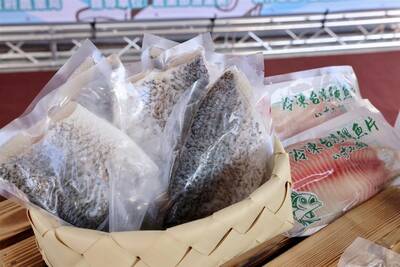In a sign of how unpopular President Chen Shui-bian (陳水扁) and his family have become, the National Police Agency (NPA) said that it was having difficulty filling the vacant position of chief of security at the presidential residence -- a job once coveted as a springboard to higher positions.
Former chief of security for the presidential residence Lee Chiu-ming (李秋明) left the post early last month, but the NPA has not found a replacement.
The Chinese language newspaper the China Times yesterday quoted an NPA official as saying that "because President Chen Shui-bian and his family are facing a political storm, some officials who were vying for the post have said they are no longer interested in the job."
The NPA yesterday declined to comment further.
The alleged insider trading of Taiwan Development Corp (TDC) shares involving Chen's son in-law Chao Chien-ming (趙建銘), which first came to light in the middle of last month, has turned the president and his relatives into near-pariahs, with many government employees now wary of having too close an association with the first family.
Changing times
It didn't used to be this way. Commissioner of the NPA's Immigration Office Wu Chen-chi (吳振吉) was the first security chief for the presidential residence when Chen became president in 2000.
He left the office in August 2001 when he was promoted to director of the Keelung City Police Department. Within five years, Wu was again promoted to commissioner of the Aviation Police Bureau and then to his current post. Wu was expected to become the first director of the proposed Cabinet-level Immigration Administration.
Wu's job at the presidential residence was turned over to former Taipei police official Hsieh Fen-fen (
In March 2003, Hsieh was appointed chief of the Ilan County Police Department -- becoming the nation's first female county police chief -- despite accusations of favoritism from the opposition party.
Wu and Hsieh became members of the Democratic Progressive Party (DPP) in January 2003 as part of the DPP's attempt to turn the police force more "green."
Hsieh was replaced as chief of security at the presidential office by Lee, who was Chen's senior high school classmate in Tainan City. His appointment in May as chief of the Keelung Harbor Police Office was not seen as a good promotion.
The NPA official told the China Times that there has been much discussion of Lee's mediocre appointment, with some saying that Chen and the first family's influence on police appointments has faded.
To avoid being caught up in the political maelstrom now engulfing the first family, many officials are sitting tight for now, preferring to see how the scandals play out before pursuing the job as presidential residence security chief.
Building `guanxi'
In the past, chiefs of Chen's bodyguard detachment have also been put on the fast track to promotions.
The first chief of Chen's bodyguard detachment Yu Lien-fa (
Yu has been the subject of a military probe since last month in connection with a stock-trading scandal.
Another military official, Peng Sheng-chu (
The president's political opponents have claimed that the reason both Yu and Peng rose so fast is that they enjoyed good relations with the president.

Taiwan's Vice President Hsiao Bi-khim (蕭美琴) said Saturday that she would not be intimidated by the Chinese Communist Party (CCP), following reports that Chinese agents planned to ram her car during a visit to the Czech Republic last year. "I had a great visit to Prague & thank the Czech authorities for their hospitality & ensuring my safety," Hsiao said on social media platform X. "The CCP's unlawful activities will NOT intimidate me from voicing Taiwan's interests in the international community," she wrote. Hsiao visited the Czech Republic on March 18 last year as vice president-elect and met with Czech Senate leadership, including

There have been clear signs of Chinese Communist Party (CCP) attempts to interfere in the nationwide recall vote on July 26 in support of Chinese Nationalist Party (KMT) legislators facing recall, an unnamed government official said, warning about possible further actions. The CCP is actively involved in Taiwanese politics, and interference in the recall vote is to be expected, with multiple Chinese state media and TAO attempts to discredit the Democratic Progressive Party (DPP) and undermine public support of their recall movement, the official said. This interference includes a smear campaign initiated this month by a pro-Beijing Hong Kong news outlet against

A week-long exhibition on modern Tibetan history and the Dalai Lama’s global advocacy opened yesterday in Taipei, featuring quotes and artworks highlighting human rights and China’s ongoing repression of Tibetans, Hong Kongers and Uighurs. The exhibition, the first organized by the Human Rights Network for Tibet and Taiwan (HRNTT), is titled “From the Snowy Ridges to the Ocean of Wisdom.” “It would be impossible for Tibetans inside Tibet to hold an exhibition like this — we can do it. because we live in a free and democratic country,” HRNTT secretary-general Tashi Tsering said. Tashi Tsering, a Taiwan-based Tibetan who has never

A first shipment of five tons of Taiwan tilapia was sent from Tainan to Singapore on Wednesday, following an order valued at NT$600,000 (US$20,500) placed with a company in the city. The products, including frozen whole fish and pre- cooked fish belly, were dispatched from Jiangjun Fishing Harbor, where a new aquatic processing and logistics center is under construction. At the launch, Tainan Mayor Huang Wei-che (黃偉哲) called the move a “breakthrough,” marking Taiwan’s expansion into the Singaporean tilapia market. Taiwan’s tilapia exports have traditionally focused on the United States, Canada, and the Middle East, Huang said, adding that the new foothold in